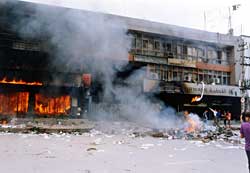 In 1995, Tulsi Ratna Tuladhar started a one-shutter shop on Kantipath selling Chinese motorcycle parts and accessories. By August 2004, he had three people to help manage an inventory worth about Rs 13 million. On Wednesday, 1 September, his shop, along with the neighbouring offices of Air Sahara and Qatar Airways, was destroyed by rioters. As Tulsi watched, it took only a few hours for a decade of hard work to turn into rubble and ashes.
In 1995, Tulsi Ratna Tuladhar started a one-shutter shop on Kantipath selling Chinese motorcycle parts and accessories. By August 2004, he had three people to help manage an inventory worth about Rs 13 million. On Wednesday, 1 September, his shop, along with the neighbouring offices of Air Sahara and Qatar Airways, was destroyed by rioters. As Tulsi watched, it took only a few hours for a decade of hard work to turn into rubble and ashes. "From 10 in the morning, people were hurling stones at the windows of Qatar Airways," said Tuladhar. "I locked up my shop, and started calling the police. They did not come. The crowd started getting bigger and restless. I was scared. Then around 11, one person showed up with a steel crowbar. He forced open the Qatar office, shattered the glass doors and went inside. Others followed and started throwing out furniture and computers. I heard them shouting when they found a box of money. After that, with crowbars in hand, they moved to adjoining offices and shops, smashing each open. The looting went on for some time before the crowd started lighting fires. The whole building was ablaze in no time. The fire brigade only arrived after the curfew was imposed at two o'clock."
Civil society pundits have written much about Hindu fervour and misplaced nationalism of the riots that took place on Black Wednesday. But a different picture emerges when you talk to business owners like Tulsi. What they witnessed were not riots imbued with religious hatred and Nepali nationalism, but people who, once they figured out that police would not come, seized an opportunity to loot.
By not intervening early and swiftly, Kathmandu's law enforcement officials provided a context for those in protesting julus to turn into looters and arsonists who damaged manpower agencies, media houses and hundreds of private-sector businesses. Any expectations that last spring's political rallies, not to mention the Hrithik Roshan riots of 2000, had made Kathmandu's police force skillful in the logistics of mob management was dashed. True, the police now claim that they have arrested more than 50 alleged looters. But don't be surprised if they remain unprepared to handle another round of riots in future.
Meanwhile, just as there is no way to seek justice through legal channels for family members whose loved ones have been killed by the Maoists or the army, there remains no recourse for business owners such as Tulsi to even think about cobbling together a path to justice. They have loans to worry about, suppliers to pay, employees to soothe and emotional trauma to deal with.
Given the gravity of Black Wednesday, FNCCI and the CNI could have, without making promises and strictly in a show of solidarity, accorded a temporary sanctuary to these victimised business owners. But mired as they are in their own diffidence and inaction, they stood by as businesses were attacked.
To keep hope alive, the only consolation for Tulsi is in Min Bahadur Gurung's story. Just as Min Bahadur created Bhatbhateni Supermarket from the ashes of his one-room cold-storage in 1994, here's hoping that Tulsi and other Nepali business owners will find the strength to rise from the ashes.



